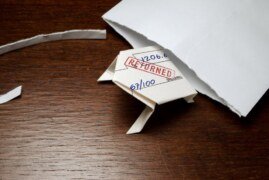Due to the UAE’s decriminalization of bounced cheques, anyone who has a cheque that has been dishonoured or returned can now file a claim directly with an execution judge in a UAE court to recover the funds owing to them.

Cheque beneficiaries or bearers are not required to pursue criminal or civil charges for non-payment of cheques under Federal Law No. 14 of 2020 Amending Certain Provisions of Federal Law No. (18) of 1993 Concerning the Commercial Transaction Law. They can go straight to the court’s execution judge and ask for payment of the cheque’s value, or whatever is left of it.
So, how can you now benefit from the change in the legislation if you have a cheque that was returned by a bank owing to insufficient money in the account of the person who issued the cheque? Here’s everything you need to know.
STEP #1 – Obtain a copy of the Cheque Execution Regulations Form.
The form can be found on Dubai Courts’ official website, dc.gov.ae. A user can use his or her UAE Pass account to create an account and gain access to the form. The form can be filled out by the person who received the bounced check, a company representative, or a lawyer. Dubai Courts issued the following prerequisites for obtaining a cheque execution service in a statement on its social media channels on January 11
- Complete the Cheque Execution Regulations form and ensure that all documents are electronic and in PDF format.
- Documents written in a foreign language must be legally verified and translated into Arabic.
Required Documents
- If the application is being filed by an individual, an identity card. If the application is being filed by a lawyer, a Lawyer Card will be required.
- If the application is being filed on behalf of the drawee, a Power of Attorney.
- If the applicant is a firm or other type of establishment, the Commercial License.
- A copy of the cheque, together with a ‘Cheque Return Memo’ stating the cause for the return.
- The relevant paperwork stating the purpose for the cheque’s issuance.
- An affidavit attesting to the accuracy of the information contained in the cheque request, as well as the fact that no claim has been filed in court to recover the amount mentioned in the bounced cheque.
- A sheet including pertinent information about the parties, their addresses, and relief in line with the value of the check.
STEP #2 – Pay the required fees.
If the court rules that the application is fit for execution, the applicant will be ordered to pay the following fees:
A payment equal to 5% of the amount of the bounced check; and AED 150 as application fees
“Once the court is satisfied that the drawee’s application is competent for execution, the court shall order the drawer to deposit the sum specified in the bounced cheque before the court.” Upon receipt of the funds by the court, the applicant must file an application with the court requesting that the funds be released. It usually takes three to seven days to complete.
“It should also be noted that if the cheque has been bounced for six months, the application will not be accepted for execution.” In such a case, according to Article 638 (1) of Federal Law No. 18 of 1993 Concerning Commercial Transactions Law, the drawee has two years to file a commercial claim with the Commercial Court against the drawer of the bounced cheque [the one who issued the cheque].



